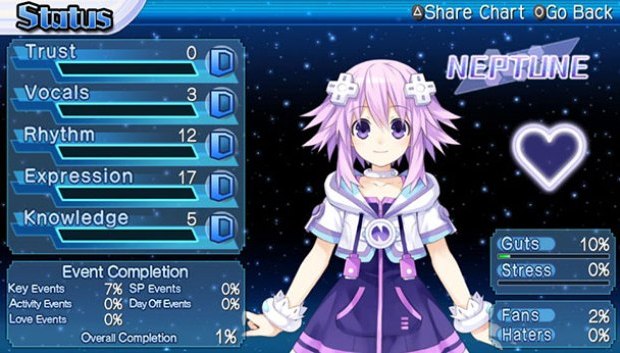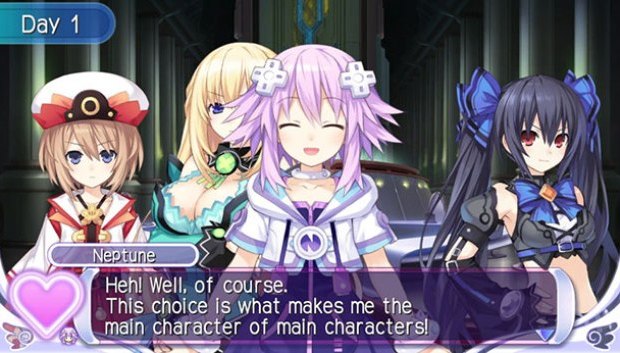I wasn’t sure what to expect when Hyperdimension Neptunia: Producing Perfection landed on my “to review” pile. My last outing with a JRPG was to review Mugen Souls Z, which didn’t go so well, and watching the trailer didn’t help; manga girls dancing around to Japanese pop songs while buzzwords flashed across the screen. Excite! Idol! CPUS!
It’s fair to say that I didn’t have particularly high expectations going into Producing Perfection, either, but it turns out I was wrong. While the rest of the Hyperdimension Neptunia series is a traditional (and from the sound of it, mediocre) JRPG, Producing Perfection is in fact a spin-off, based around managing a CPU and turning her into a pop idol.
What’s a CPU I hear you cry? Well, they are the goddesses of their world, Gamindustri. Each represents a console from the last generation, the Wii, PS3, and 360, as well as the cancelled Sega Neptune. In the main series they squabble for control in their realm, but here they’ve decided to team up as the monsters they usually fight have formed an epic idol group called MOB48 and have taken all the planet’s “shares” (basically prayers).

Rather than beat the monsters up, they’ve chosen to beat them at their own game – which is where you come in. Set in the real world, you take the role of a student settling down for a summer gaming marathon, before you’re unwittingly summoned through your TV and made to choose a CPU to manage.
Each has their own personality, though managing them boils down to the same actions. Neptune, who embodies Sega’s console, is childish and energetic, Noire, the PS3 CPU, is individualistic, doing things in her own time, Vert is the 360, intelligent but arrogant and Blanc represents the Wii, who gets loud and angry despite looking quiet. Once you pick one, the rest set off in competition.
As stories go it’s pretty original, the setting of the Console Wars a neat nod to gaming, with references made frequently in the dialogue, even if it is completely ridiculous. You’re given 180 days to accumulate the most shares, picking an activity each day to improve your Idol’s stats, boost their shares or relax to de-stress. For example, you can choose to do some publicity like a meet and greet, or go to vocal coaching to improve the singing stat.

Each action varies in its effectiveness, and the better it is, the longer the cool down: studying raises all of your stats, but can only be used every seven days. It becomes a neat balancing system, trying to raise your character’s level while promoting her enough and making sure she doesn’t get too stressed (if the bar reaches 100%, you lose the game).
Every other week or so you’ll also have the opportunity to put on a concert. These take the form of a mini-game, where you pick the song (each Idol has their own, which the others unlock as the game progresses, plus a final track when you win), the stage and the Idol’s outfit before applying special effects such as a spotlight, and controlling the camera during the performance. Apparently this is to increase your Stage Points, measured at the bottom of the screen, but I never noticed a difference between artful use and mashing the buttons wildly. Likewise, the proportion of new fans didn’t seem to vary depending on what I did.
To make the story more engaging, random events pop up, with basic dialogue choices to interact with the characters. It breaks the repetition of the story mode, but at the same time some of them take an entire day and can feel like a wasted opportunity to improve your stats.

In all honesty there isn’t much depth to the story mode. I improved my Idol’s levels but never felt that this earned me greater rewards during publicity events or concerts, and despite the 180-day timer I’d finished in half that time – roughly 4 hours of play. On the one hand this is a plus: as a portable title it’s perfect for those moments on the bus or train, completing a day or two when you can. But as a full price release it should be deeper than this. There is an option to form a group with the other Idols, but it requires spending a few days with them and becoming friends first. That wouldn’t be a problem but the day after the ability was unlocked I was forced to form a group with Vert. There’s no point giving you a choice only to make it for you as well.
There is a new game plus mode for when you finish, as well as three other Idols to manage, but once you’ve played through once there isn’t really anything you haven’t seen. At least Producing Perfection looks great thanks to the beautifully-drawn manga that makes up the bulk of the game. Even the 3D engine that powers the concerts looks good on the small screen, and the Japanese pop that accompanies it is nice to listen to.

As seems to be the standard for JRPGs, there is a bit of over-sexualisation of the Idols, complete with unrealistic jiggling physics, but not too much. Only one has overly large assets, and she is also clearly the oldest there; also, the premise kind of makes sense – for better or for worse pop stars are as much about their sexuality as they are their music. Sadly there is a viewer mode where you can touch the 3D character models, either on the chest, crotch or backside to force a reaction. It’s clearly only for one thing, and while it can be ignored, it still niggles that it exists.
VERDICT: Hyperdimension Neptunia: Producing Perfection is a decent, if feature-light, management game. It’s helped massively by the premise, but the execution, from the cute graphics to the ease of use, might make this worth looking into if you fancy a management sim on the go. Just don’t expect hidden depths – like the generic pop the game asks you to sell, what you see is what you get.

DECENT. A 6/10 indicates that, while this game could be much better, it still has a fair amount to offer the player. It might be an interesting title sabotaged by its own ambition, or a game denied greater praise by some questionable design choices. Don’t avoid it outright, but approach it with caution.
Review code provided by publisher.






